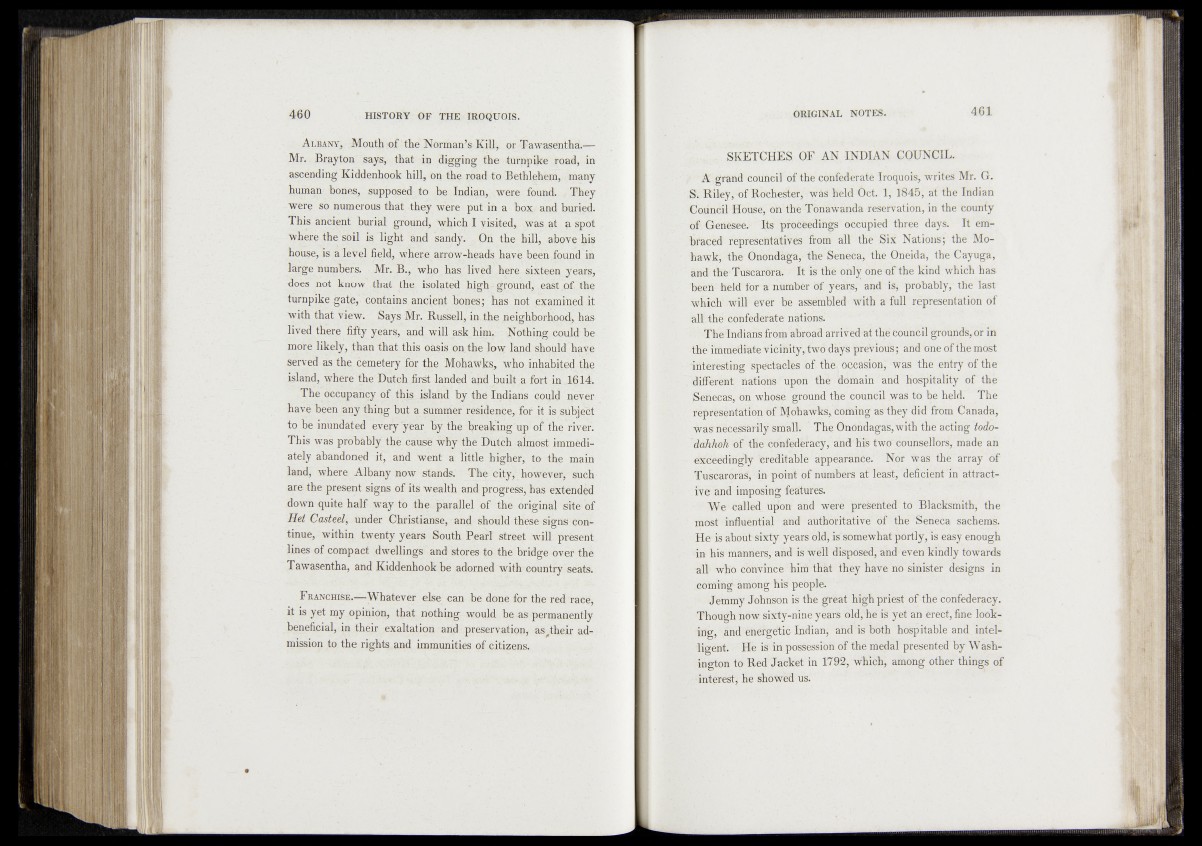
A l b a n y , Mouth ,-of1 the Norman VKill; or 'Tawasefotha.—
Mr.. Rrayton says, that in digging the tarhpijfe road, in
ascending Kiddenhook hill, on the road to Bethlphem, - many
human bones, supposed to '^e Indian, .were found. | They
wfere So/numerous that,-they were- putifon- baa^ and,buried..
This ancient burial ground, which I visited, was at a spot
v?here the soil is light and saildy. On the hill, abpve ^if
house, is a level field, where arrow-heads have been,found in
large numbers. Mr. B., who has^ lived here sixteen years,
does not know that the isolated high^ ground, east „of the
turnpike gate,', contains, ancient bones j foas hot' examined it
with that view. 'Says Mr. Ruskell, ip. the neighborhoods, has
lived there fifty years, and will ask him. Nothing could’^J-
more likely, than that thig oa^ton/the Io\y land- sho^ldliave
served as the cemetery for t^e. Mo'haWjcs, who inhabited the
island, where the’Dutch first landed and builj/u fort in_16l4
The oecupaficy of thls island bythejnd^njs eoqitj ^ev-er
have been’any thing but a summer'residence, fof .it is- euljJeSt
to bfe; inundated every year by the breaking/ujftoftthe 'riv,er/
This was prob&bly the.catiSe? i^byjttHe Dutch almost immediately
abandoned- It, and Wont’ a little-'lrigber*\tr't^e mail-
land, where Albany now stands. The city* ;ftaWev@r,- ^ach
are the present signs of its wealth and progress, has extended
.down quite half way to the ^parallel of- the original ^Jfte4 Of
Hei Gastzel, under Chfistianse, 'and should these sigM-fcOh-
tfoue, within twenty years South Pearl street will present,
lines of compact dwellings ‘ and stores to the bridge-over the
Tawasentha, and Kiddenhook be adorned with" country seats.
Franchise.—Whatever else can be done for the red. race,
it is yet my opinion, that nothingwould beuspermanently
beneficial, in their exaltation 3 and preservation, as /their ad-
mission to the rights and immunities of citizens. ;
£ SKETCHES OF AN INDIAN COUNCIL.
■- Asgrand council ’of the confederate Iroquois, writes Mr. G.
Sv. Riley, >bf Rbchesfer/- w&e held Oct. 1, 1845, at the Indian
Council House', oh’thte Tonawanda-reservation, in the county
pf Genesee.'- Its proceedings occupied three days. It embraced'
represeittatives ftom all the Six Nations; the Mohawk,/
the Onondaga, the Seneca, the Oneida, the Cayuga,
and the-Tuscarora.' -"'It is the only one qf the kind which has
"been- held fora number b£ years; and is, probably, the last
which1 will evfer -be assembled “With a’ full representation of
all.the confederate nations/ 1
4 The'Indiahs from'abroad arrived-af th£ Council grounds, or in
the immediate vWf®ty,ftwo days previodS; and one of the most
PBlerbsihg -spectacles .oft the. occasion,' was the entry of the
different liatiqns upon the domain and hospitality of the
jSeheCas, cm whose ground* the' council '.was to be held. The
representation Of Mohawks, coming as fbey did from Canada,
was'hecess&rily small: ' The On0ndagas,‘with the acting 'tom-
'dahh'oh bf'tfte -cdhfedir&cy, and his two counsellors, made an
exceedingly Creditable appearance. Nor was the array of
TuscaroraS, in point of numbers at1 leasts‘'deficient‘in attract-
ive'and imposing features.
We1 called, upon and wcfh^presfefited td Blacksmith; the
most influential and authoritative of the Seneca sachems.
Hejs abouftsixty.years bid, is'somewhat portly, is easy enoilgh
-in his manners, and is well disposed, and even kindly towards
all who convince him that they have no sinister designs in
coming among his pebpfel' '
Jemmy Johnson is the great high priest of the confederacy.
Though now siXty-nipe years old,“'he is yet an erect, fine looking,
and endrgetic Indian, and'is both hbSpitable and intelligent
.: He is' in possession of the medal presented hy Wash-
ington to Red Jacket in 1792, wTiich, among other things oft
interest, he showed us.